The European Union has signed an air transport agreement with Qatar. In a number of countries, including the Netherlands, unlimited flights are not allowed at the moment.
from new deal Including the terms of air carriage between Qatar and the European Union, it will replace the bilateral agreements that some European countries have already concluded with Qatar. This includes capacity caps for five important markets: Belgium, Germany, France, Italy and the Netherlands. Airlines operating from those countries are allowed to operate the largest number of flights to and from Qatar. Conversely, the same applies to Qatar Airways, which is allowed to operate the same number of flights to those five countries each week.
In the Netherlands, there are fourteen passenger flights per week between Amsterdam and Qatar. In addition, passengers can travel fourteen times a week between other Dutch airports and Qatar, and finally fourteen weekly cargo flights may be accomplished. According to the authority, flight caps for all five markets must be re-set annually at the start of winter. In this way the flight numbers can be configured incrementally. In the winter of 2024-2025, the capacity caps will be permanently canceled.
In 2016, the European Commission was mandated by member states to reach an agreement with Qatar. A number of European airlines were concerned about a level playing field. There are also concerns about the rapid growth of Qatar Airways. This has ensured in recent years that Qatar becomes the 15th largest market for airlines within the European Union. Qatar Airways has been named the best airline in the world multiple times and has put Doha on the map as a transport hub for travelers from Europe to Asia. Therefore, ensuring open and fair competition for air transport is critical, including for routes between the European Union and Asia. The agreement should ensure greater financial transparency. Strict conditions are also imposed on subsidies to companies, which can only be achieved in a certain number of circumstances.
In addition to provisions on flight numbers and fair competition, the agreement also contains provisions on social and environmental issues. “This agreement, the first between the European Union and a Gulf country, sets a global standard for forward-looking aviation agreements,” said European Transport Commissioner Adina Valian proudly. “This agreement will provide new opportunities, greater choice and higher standards for travelers, industry and aviation employees.”

“Total coffee specialist. Hardcore reader. Incurable music scholar. Web guru. Freelance troublemaker. Problem solver. Travel trailblazer.”







More Stories
GALA lacks a chapter on e-health
Weird beer can taste really good.
Planets contain much more water than previously thought